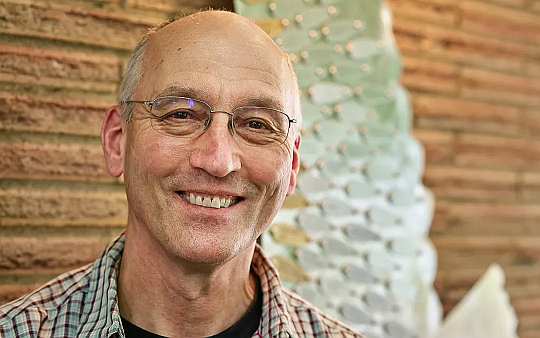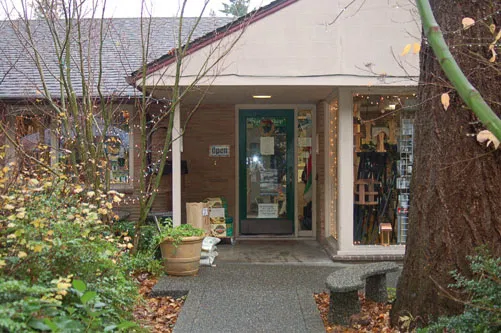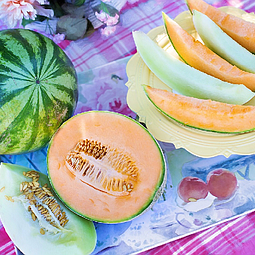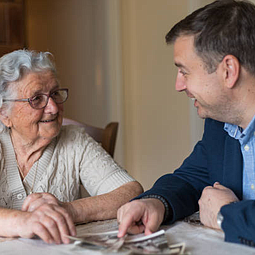Welcoming the World: Russ Steele & the Nature Shop
July 6, 2022 at 1:13 p.m.
After 24 years at Seattle Audubon, Russell Steele, or Russ to most, the longest-tenured employee in the organization’s history retired at the end of June 2022. As the Seattle Audubon Society’s way of saying thank you and goodbye, they ran this chapter from “Caring for Birds & Nature: 100 Years of Seattle Audubon,” their centennial book edited by Connie Sidles.
Throughout Russ’ tenure, many visitors to the Nature Shop would ask, “Is Russ here?” As word spread of his impending retirement, they’ve adjusted that query to, “Is Russ still here?” On July 1, our answer, sadly, is “Sorry, no.”
People in Seattle Audubon say the Nature Shop is the face of our society, and that is certainly true. The staff and volunteers who welcome one and all are, for many people in Seattle, the first contact they have with Seattle Audubon. But the shop is far more. It is the living heart of the Audubon community. Whether you’re a birder, a conservation activist, or just a nature lover who wants to feed a few backyard birds, you feel the minute you come in that you are in the presence of like-minded people, folks who are eager to share their passion for birds and nature. And you know you are home.
In the words of Russ Steele, from 2016
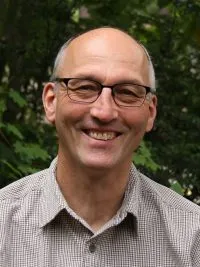
“At the time of my hiring, they had this marvelous volunteer, George Johnson, who had been working as the Merchandise Manager of Seattle Audubon’s retail sales for fifteen years. He had a background in business, and after he retired, he came to Seattle Audubon to volunteer.
“In those days, Audubon didn’t do much with retail sales, except for the books we published ourselves. Our first major outside product was the 1983 edition of National Geographic’s Field Guide to the Birds of North America. Back then, the National Geographic Society wasn’t the sophisticated publisher they are today, which is to say, they didn’t know how to distribute their book. So they offered it to nonprofit organizations first. Somehow they found Seattle Audubon. It was just at the time George was retiring. The board said to George, ‘Here’s a product, and here you are. Maybe we can put the two of you together and have you march forward.’ ”
The Nature Shop is Born
“From there, George saw a need amongst the membership for bird supplies—mostly feeders and seed. So he started cobbling together a product line. We didn’t have our own building then. We rented offices in the Joshua Green Building downtown, but there wasn’t any room there for sales. So George initiated a series of seed depots, he called them. I think he had six around the city. George would have a big load of seed delivered to his house in Bellevue, and then he would distribute it himself, driving it around to all the different depots. Volunteers would sell feeders and seed at the depots and give the money back to the organization.
“When Seattle Audubon moved its offices in March 1990 to Wedgwood at 8050 35th Avenue NE, we had the space for more product offerings. Once we had a storefront, the seed depots started drifting off, because there was a place where customers could get to easily and park. But George was still putting in probably 30- to 40-hour weeks, and even when he’d go on vacation, he’d still call in to be sure the volunteers were doing what they needed to do. Finally, he wrote a letter to the board in 1991 saying they really needed to hire somebody to do this.
“It took the board seven years more to come to the conclusion that George was right, and they needed to hire someone part-time. It was a really big decision for the board to make. Not only did they have to decide whether the new position was going to be salaried, hourly, or on commission, they also had to get clear on what the purpose of a nature store might be and what products we ought to stock.
“In the end, I was hired as a part-time store manager and later did part-time bookkeeping too. The advertising budget I had when I started was a total of $600, but half of that had been spent on advertising for the position, so I had very little marketing money to work with at the start. But the bar was not set very high for success. The gross revenues for the shop were about $160,000.
“Retail is very simple. You have stuff. You buy it for X. You sell it for Y. You have somebody in the shop to sell. You unlock your doors. You let people in. They buy. You lock your doors. You count your money.
“But our retail operation is not really that simple. It’s grown since I started. Now we’re in our own building, and I’m here full time. I have a part-time assistant. We stock more than 2,000 items, and we use a big pool of volunteers to do the labor. There’s a core of about 40 volunteers. We’re open from 10:00 a.m. to 5:00 p.m. Monday through Saturday and 11 a.m. to 4 p.m. on Sunday. The volunteers work in two shifts, and there are two volunteers per shift. A big part of my job is supporting those volunteers. Many of them come in to work on a regular basis. For example, generally there are a steady two people who work every Monday morning, and another two people who work every Monday afternoon. That’s typical for every day of the week. But people get sick, they have friends visiting, they travel. So I have a second group of subs who fill in. It’s a great group of people. They appreciate the flexibility. They don’t need a regular shift. It’s a nice blend.”
Operations Evolve
“Mainly, volunteers do the clerking. But they have other responsibilities too, and they’re at a high level. Volunteers register people for classes and field trips. They need to be literate about all our products, including optics (which is about half our business) and non-optics. They need to know how to register people to become members of Seattle Audubon. They must welcome all the visitors who come into the shop, no matter how busy we are. On a Saturday in December, for example, we’ll have 100 to 200 customers during the day. And then the phone is going to ring, and somebody is going to say, ‘There’s a person about to chop a tree down across the street. How do I stop this, because I know birds nest in it?’ Or, ‘A hawk has been stuck in my chimney for two days and won’t come out. I’ve been putting Cheerios in the grate, but the hawk doesn’t like them. What do I do?’ Or, the most common, ‘There’s this bird I saw. Can you tell me what it is?’
“All these interactions, including sales, are termed ‘transactions.’ Last December we had 2,300 transactions for the month. Although I hold firm to the priority to create positive net revenue for the organization—we need to make money— the Nature Shop has other goals. I could sell things people don’t need. I have those skills. But that’s not my job here. We aren’t here to push sales up. Our job is to find out what people need and then try to make sure they get it. For example, a customer might come in and say, ‘I already have a feeder and I want to buy another one just like it.’ Our volunteers are trained to find out why that customer wants another feeder. Sometimes, it’s because a customer wants to attract different birds than the ones already coming. So we would say, ‘We probably need to talk about a different feeding strategy. Do you have a suet feeder? A hummingbird feeder?’ We try to learn what a customer’s needs are so we can fulfill those needs. At the same time, because of who we are, we have an obligation to not be purely profit-driven. We don’t stock some products because we don’t believe they’re the right choice for the birds. For example, we don’t carry any desiccants for seed feeders. Those are chemicals that absorb moisture so the seed doesn’t go bad in the feeder. While one of our scientists tells me desiccants are probably harmless to the birds, to stock them sends the wrong message to our customers. It sends the message that you don’t have to clean your feeder.
“Feeder hygiene is a very important message for us to give people because it’s more than just the seed going bad that can be harmful to birds. It’s also the birds’ fecal matter that’s a vector to spreading disease. So we want people to clean their feeders. When we sell them seed, we have an opportunity to educate them about best practices.
“We are doing about half a million dollars' worth of business now, so we’ve trebled the revenue since I was hired. Our customer satisfaction rate is around 97 percent. The volunteers have enjoyed the ride. They’ve enjoyed the growth. They feel part of it, and they should feel part of it. They really are the face of the organization. They volunteer for the Nature Shop because they care about birds. That’s why they came to Seattle Audubon. They want to apply their passion and be evangelists for birds. They would never use that word, but I certainly would because that’s what they’re doing. They’re sharing their passion.
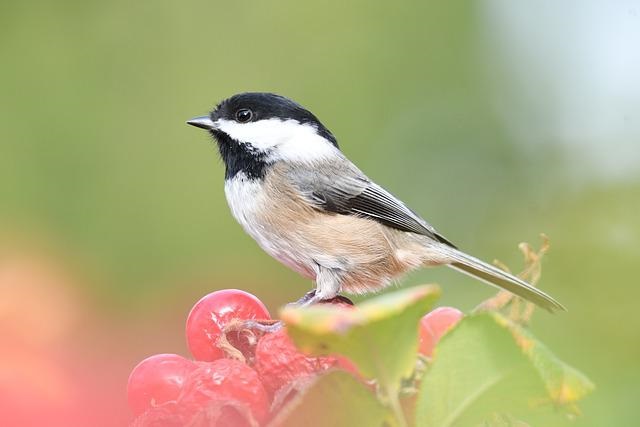
“One day we had a little boy come in with his dad. He was a quiet little guy, maybe seven or eight years old. He had a jar of money in his hands, and he said, ‘I want to give this for the birds.’ That’s when our volunteers showed how great they really are, and how much they get what we’re all about. They got down to his level and helped him count the money. We asked his name, but he said he wanted to be ‘anonymous.’ So he had been coached by his dad, obviously, but we could see he really wanted to help the birds. And he did. That’s why we’re here.”
View the original article: Welcoming the World: Russ Steele & the Nature Shop - Seattle Audubon Society
